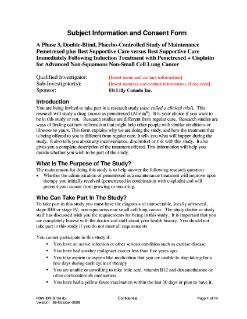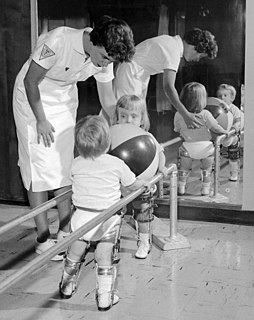
Medicine is the science and practice of establishing the diagnosis, prognosis, treatment, and prevention of disease. Medicine encompasses a variety of health care practices evolved to maintain and restore health by the prevention and treatment of illness. Contemporary medicine applies biomedical sciences, biomedical research, genetics, and medical technology to diagnose, treat, and prevent injury and disease, typically through pharmaceuticals or surgery, but also through therapies as diverse as psychotherapy, external splints and traction, medical devices, biologics, and ionizing radiation, amongst others.

Informed consent is a process for getting permission before conducting a healthcare intervention on a person, or for disclosing personal information. A health care provider may ask a patient to consent to receive therapy before providing it, or a clinical researcher may ask a research participant before enrolling that person into a clinical trial. Informed consent is collected according to guidelines from the fields of medical ethics and research ethics.
Sex reassignment surgery (SRS), also known as gender reassignment surgery (GRS) and several other names, is a surgical procedure by which a transgender person's physical appearance and function of their existing sexual characteristics are altered to resemble that socially associated with their identified gender. It is part of a treatment for gender dysphoria in transgender people.

Medical ethics is a system of moral principles that apply values to the practice of clinical medicine and in scientific research. Medical ethics is based on a set of values that professionals can refer to in the case of any confusion or conflict. These values include the respect for autonomy, non-maleficence, beneficence, and justice. Such tenets may allow doctors, care providers, and families to create a treatment plan and work towards the same common goal. It is important to note that these four values are not ranked in order of importance or relevance and that they all encompass values pertaining to medical ethics. However, a conflict may arise leading to the need for hierarchy in an ethical system, such that some moral elements overrule others with the purpose of applying the best moral judgement to a difficult medical situation.
Clinical trials are experiments or observations done in clinical research. Such prospective biomedical or behavioral research studies on human participants are designed to answer specific questions about biomedical or behavioral interventions, including new treatments and known interventions that warrant further study and comparison. Clinical trials generate data on safety and efficacy. They are conducted only after they have received health authority/ethics committee approval in the country where approval of the therapy is sought. These authorities are responsible for vetting the risk/benefit ratio of the trial – their approval does not mean that the therapy is 'safe' or effective, only that the trial may be conducted.
A podiatrist, also known as a podiatric physician or foot and ankle surgeon, is a medical professional devoted to the treatment of disorders of the foot, ankle, and lower extremity. The term originated in North America, but has now become the accepted term in the English-speaking world for all practitioners of podiatric medicine.

Podiatry is a branch of medicine devoted to the study, diagnosis, and medical and surgical treatment of disorders of the foot, ankle, and lower extremity. The term podiatry came into use in the early 20th century in the United States and is now used worldwide, including in countries such as the United Kingdom, Australia, and Canada.

Oral and maxillofacial surgery specializes in surgery of the face, mouth, and jaws. It is an internationally recognized surgical specialty. OMFS is a specialty of dentistry in North America, Central America, South America, Australia, New Zealand, Russia, Asia, and Scandinavia. After a full degree in dentistry, the dental specialty residency of oral and maxillofacial surgery may or may not include a full degree in medicine. In countries such as the UK and most of Europe, it is recognized as a specialty of medicine and a degree in medicine or both degrees in dentistry and medicine are compulsory.
Prosthodontics, also known as dental prosthetics or prosthetic dentistry, is the area of dentistry that focuses on dental prostheses. It is one of nine dental specialties recognized by the American Dental Association (ADA), Royal College of Surgeons of England, Royal College of Surgeons of Edinburgh, Royal College of Surgeons of Ireland, Royal College of Surgeons of Glasgow, Royal College of Dentists of Canada, and Royal Australasian College of Dental Surgeons. The ADA defines it as "the dental specialty pertaining to the diagnosis, treatment planning, rehabilitation and maintenance of the oral function, comfort, appearance and health of patients with clinical conditions associated with missing or deficient teeth or oral and maxillofacial tissues using biocompatible substitutes."

The American College of Physicians (ACP) is a national organization of internists, who specialize in the diagnosis, treatment, and care of adults. With 154,000 members, ACP is the largest medical-specialty organization and second-largest physician group in the United States, after the American Medical Association. Its flagship journal, the Annals of Internal Medicine, is considered one of the five top medical journals in the United States and Britain.
A medical assistant, also known as a "clinical assistant" or healthcare assistant in the USA is an allied health professional who supports the work of physicians and other health professionals, usually in a clinic setting. Medical assistants can become certified through an accredited program. Medical assistants perform routine tasks and procedures in a medical clinic.
Direct health professions are health care professions distinct from nursing, medicine, and pharmacy. They work in health care teams to make the health care system function by providing a range of diagnostic, technical, therapeutic and direct patient care and support services that are critical to the other health professionals they work with and the patients they serve.
The UCLA School of Dentistry is the dental school of the University of California, Los Angeles (UCLA) located in the Center for Health Sciences building in the Westwood neighborhood of Los Angeles, California, United States. The school has several educational and training programs, conducts oral and dental health research, and offers affordable dental care at three locations: Westwood, Venice, and Inglewood. The school also participates in several outreach endeavors, including numerous health fairs during the year, STEM pipeline programs and provides dental care for underserved populations in the region. The School of Dentistry is considered among the nation's best research-intensive dental schools.

The Royal College of Surgeons of Edinburgh (RCSEd) is an independent, charitable professional organisation committed to advancing surgical excellence through education, training, examinations and CPD, with a focus on patient care and patient outcomes. The College has seven active Faculties, covering the broad spectrum of surgical, dental and other medical practice. Its main campus is located on Nicolson Street, Edinburgh, within the William Henry Playfair designed Surgeons' Hall and adjoining buildings. The main campus includes a dedicated skills laboratory, the award-winning Surgeons' Hall Museums, a medical and surgical library and the 4-star Ten Hill Place Hotel. A second office was opened in Birmingham (UK) in 2014 and an international office opened in Kuala Lumpur, Malaysia in 2018.

Dental assistants are members of the dental team. They may support a dental operator in providing more efficient dental treatment. Dental assistants are distinguished from other groups of dental auxiliaries by differing training, roles and patient scopes.

Sleep medicine is a medical specialty or subspecialty devoted to the diagnosis and therapy of sleep disturbances and disorders. From the middle of the 20th century, research has provided increasing knowledge and answered many questions about sleep-wake functioning. The rapidly evolving field has become a recognized medical subspecialty in some countries. Dental sleep medicine also qualifies for board certification in some countries. Properly organized, minimum 12-month, postgraduate training programs are still being defined in the United States. In some countries, the sleep researchers and the physicians who treat patients may be the same people.

Maternal–fetal medicine (MFM), also known as perinatology, is a branch of medicine that focuses on managing health concerns of the mother and fetus prior to, during, and shortly after pregnancy.
Bariatric surgery includes a variety of procedures performed on people who have obesity. Weight loss is achieved by reducing the size of the stomach with a gastric band or through removal of a portion of the stomach or by resecting and re-routing the small intestine to a small stomach pouch.
A medical tourism agent is an organisation or a company which seeks to bring together a prospective patient with a service provider, usually a hospital or a clinic. These organisations are generally facilitators and developers of medical tourism, which brings into play a number of issues that do not apply when a patient stays within their own country of origin.
Dental antibiotic prophylaxis is the administration of antibiotics to a dental patient for prevention of harmful consequences of bacteremia, that may be caused by invasion of the oral flora into an injured gingival or peri-apical vessel during dental treatment.
















